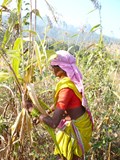
The Food and Agriculture Organization (FAO) of the United Nations has stated that the invasion of locusts has resulted in the destruction of over 6,000 hectares of agricultural land in several northern provinces of the country.
Richard Trenchard, the FAO Representative in Afghanistan, drew attention to the severity of the situation by stating that the Moroccan locust is considered the world's most economically impactful plant pest. He explained that these locusts consume over 150 plant pests and more than 50 food crops. The voracious appetite of these locusts poses a significant threat to the agricultural sector in the affected regions.
Trenchard emphasized the urgent need to support farmers in response to this crisis. He expressed the necessity of pre-positioning resources to ensure that households at risk of losing everything can receive the necessary food assistance. He further explained that the majority of affected farmers require agricultural support and emergency aid.
Additionally, Trenchard issued a warning about the locust's rapid multiplication, stating that it can multiply a hundredfold each year. He emphasized the importance of preventing a far worse outbreak in the following year.
Farmers impacted by the locust invasion expressed their helplessness in combating the pests and made an appeal for assistance from aid organizations. Najibullah, a distressed farmer, lamented that the Moroccan locust had destroyed 300 acres of his wheat field and had affected 31,000 acres of land in the area, which is home to ten villages.
The provinces of Badakhshan, Badghis, Baghlan, Balkh, Sur-e-Pul, Samangan, and Takhar have been particularly hard-hit by the locust invasion, experiencing substantial agricultural losses. Urgent measures are required to address this crisis, safeguarding the livelihoods of farmers and ensuring food security in the affected regions.
The situation demands collaborative efforts among local farmers, government authorities, and international organizations to combat the locust invasion effectively. Swift action and timely provision of resources and assistance are crucial to mitigate the impact on agriculture and prevent a more severe outbreak in the upcoming year.
It is essential to aid organizations and government bodies to work hand in hand to alleviate the suffering of farmers and provide the necessary support to help them recover from the devastation caused by the locust invasion. Such collective efforts are vital to restoring stability and ensuring sustainable agricultural practices in the affected regions of Afghanistan.
















